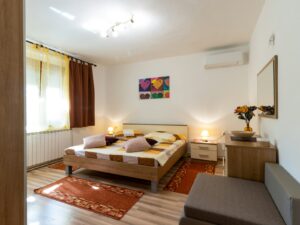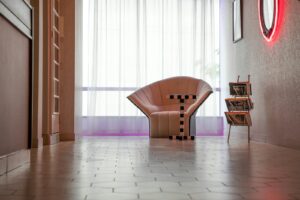SPC flooring, short for Stone Plastic Composite flooring, is a type of rigid core vinyl flooring made from a combination of natural limestone powder, polyvinyl chloride, and stabilizers. It is known for its high durability, water resistance, and easy maintenance, making it a popular choice for residential and commercial spaces alike.
SPC vinyl flooring is renowned for its exceptional durability, often lasting anywhere from 10 to 20 years or even longer with proper care and maintenance. Its water-resistant properties make it suitable for use in bathrooms, where exposure to moisture is common. Similarly, SPC flooring is an excellent choice for kitchens due to its resistance to water and spills, making cleanup a breeze.
While SPC flooring is highly water-resistant, it is essential to note that it is not entirely waterproof. While it can withstand water exposure better than many other flooring options, prolonged exposure to standing water or flooding may still cause damage over time. Therefore, it’s advisable to wipe up spills promptly and avoid installing SPC flooring in areas prone to frequent flooding or standing water.
Pros of SPC Flooring
Durability and Longevity: One of the primary advantages of SPC flooring is its exceptional durability. The rigid core construction ensures that SPC flooring can withstand heavy foot traffic, making it an ideal choice for high-traffic areas in both residential and commercial settings.
Water Resistance: SPC flooring is inherently water-resistant, making it highly suitable for areas prone to spills, moisture, and humidity. Unlike traditional hardwood flooring, SPC flooring will not warp, swell, or buckle when exposed to water, making it an excellent choice for bathrooms, kitchens, and laundry rooms.
Easy Maintenance: SPC flooring is incredibly easy to maintain. Its smooth surface can be easily swept, vacuumed, or mopped to keep it clean and looking like new. Unlike carpet, SPC flooring does not trap dust, dirt, or allergens, making it a great choice for allergy sufferers.
Wide Range of Designs and Styles: SPC flooring is available in a wide range of designs, colors, and styles, allowing homeowners to achieve the look they desire for their space. Whether you prefer the look of hardwood, tile, or stone, there is an SPC flooring option to suit your taste and aesthetic preferences.
Environmentally Friendly Aspects: Some SPC flooring products are made from recycled materials and are recyclable themselves, making them an environmentally friendly flooring option.
Cons of SPC Flooring
Higher Initial Cost: While SPC flooring offers numerous benefits, it typically comes with a higher initial cost compared to some other flooring options such as laminate or carpet. However, many homeowners find that the long-term durability and low maintenance requirements of SPC flooring justify the initial investment.
Lack of Warmth and Authenticity: While SPC flooring can mimic the look of natural materials such as hardwood or stone, some homeowners may find that it lacks the warmth and authenticity of these materials. However, advancements in printing and embossing technologies have greatly improved the realism of SPC flooring designs in recent years.
Limited Sound Absorption Properties: Due to its rigid construction, SPC flooring may not offer the same level of sound absorption as softer flooring materials such as carpet. This can result in increased noise levels in areas with SPC flooring, particularly in multi-story homes or buildings.
Potential for Expansion and Contraction: Like any vinyl flooring, SPC flooring may expand and contract slightly in response to changes in temperature and humidity. While proper installation techniques can minimize this risk, it is still something to consider, especially in environments with extreme temperature fluctuations.
Installation May Require Professional Assistance: While some homeowners may choose to install SPC flooring themselves, it is often recommended to hire a professional installer to ensure proper installation and optimal performance of the flooring.
Conclusion
In summary, SPC flooring offers numerous advantages, including durability, water resistance, easy maintenance, and a wide range of design options. However, it is essential to consider its drawbacks, such as the higher initial cost and potential for noise transmission. Ultimately, the decision to install SPC flooring should be based on a careful evaluation of its pros and cons, as well as your specific needs and preferences. With proper consideration, SPC flooring can be an excellent choice for creating a beautiful, durable, and low-maintenance space in your home or business.
Read More
Difference Between SPC and LVT Vinyl Flooring
Diffrence between SPC and WPC flooring
Does SPC Vinyl Flooring Need Underlayment




